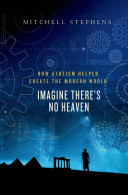Science was Inconvenient for Religion
Science’s contributions to the spread of disbelief is the least controversial segment of the virtuous cycle for which I am arguing in seventeenth-century Europe. For science’s methods are clearly troublesome for religion. The devout, to begin with, are not wont to view their precepts merely as propositions to be controverted or confirmed. The orthodox, as a rule, are used to arguments being settled by authority, not experiment. The hope belief offers does not always stand up well to observation and experience: life sometimes works out okay; sometimes it doesn’t. Faith, particularly of the “certain-because-impossible” variety, and reason have long been tussling. Miracles are notoriously miserly with evidence. Revelation does not lend itself to experimental verification. And the mystical, by its nature, fails to produce facts.
When it is employed, the scientific method, consequently, has a way of uncovering information that is inconvenient for religion. Conflicts are inevitable with ancient holy books—most of which do end up proclaiming something or other on “how” the earth works or “heaven goes.” Scientists in these centuries diverged from Scripture at their peril. Galileo learned that. But in the end the greater cost would be borne by the holy books. Catholic leaders did indeed have reason to fear that, in taking Copernicus’ theory seriously, Galileo might encourage people to take the Bible less seriously.
Notes:
As scientific knowledge grew it revealed knowledge that conflicted with scripture.
Folksonomies: science religion
Taxonomies:
/religion and spirituality (0.721568)
/technology and computing/consumer electronics/camera and photo equipment/telescopes (0.447210)
/art and entertainment/books and literature (0.444043)
Keywords:
ancient holy books—most (0.986948 (negative:-0.398157)), virtuous cycle (0.830127 (negative:-0.565931)), seventeenth-century Europe (0.822022 (negative:-0.565931)), controversial segment (0.821820 (negative:-0.565931)), Science’s contributions (0.778091 (negative:-0.565931)), scientific knowledge (0.771016 (positive:0.413374)), hope belief (0.759543 (positive:0.267628)), experimental verification (0.757355 (negative:-0.238138)), greater cost (0.736190 (negative:-0.340831)), Catholic leaders (0.732279 (negative:-0.539517)), heaven goes. (0.724872 (neutral:0.000000)), scientific method (0.721416 (positive:0.317274)), religion (0.616097 (positive:0.358289)), reason (0.561679 (negative:-0.539517)), scripture (0.559692 (positive:0.413374)), Galileo (0.553019 (positive:0.313781)), disbelief (0.510387 (negative:-0.565931)), devout (0.499928 (positive:0.282943)), precepts (0.491571 (neutral:0.000000)), propositions (0.490515 (neutral:0.000000)), peril (0.484591 (neutral:0.000000)), Copernicus (0.480774 (neutral:0.000000)), Miracles (0.473831 (negative:-0.713492)), spread (0.473058 (negative:-0.565931)), arguments (0.471522 (neutral:0.000000)), observation (0.471265 (positive:0.267628)), methods (0.469646 (neutral:0.000000)), Conflicts (0.469557 (negative:-0.398157)), Revelation (0.467818 (negative:-0.238138)), orthodox (0.465727 (neutral:0.000000))
Entities:
Galileo:Person (0.869433 (positive:0.313781)), Europe:Country (0.599089 (negative:-0.565931))
Concepts:
Science (0.982332): dbpedia | freebase | opencyc
Scientific method (0.976459): dbpedia | freebase
Epistemology (0.792154): dbpedia | freebase | opencyc
Theory (0.681624): dbpedia | freebase
Revelation (0.655833): dbpedia | freebase
Scientific revolution (0.616706): dbpedia | freebase
Religion (0.608675): dbpedia | freebase | opencyc
Aristotle (0.571568): dbpedia | freebase | opencyc | yago





